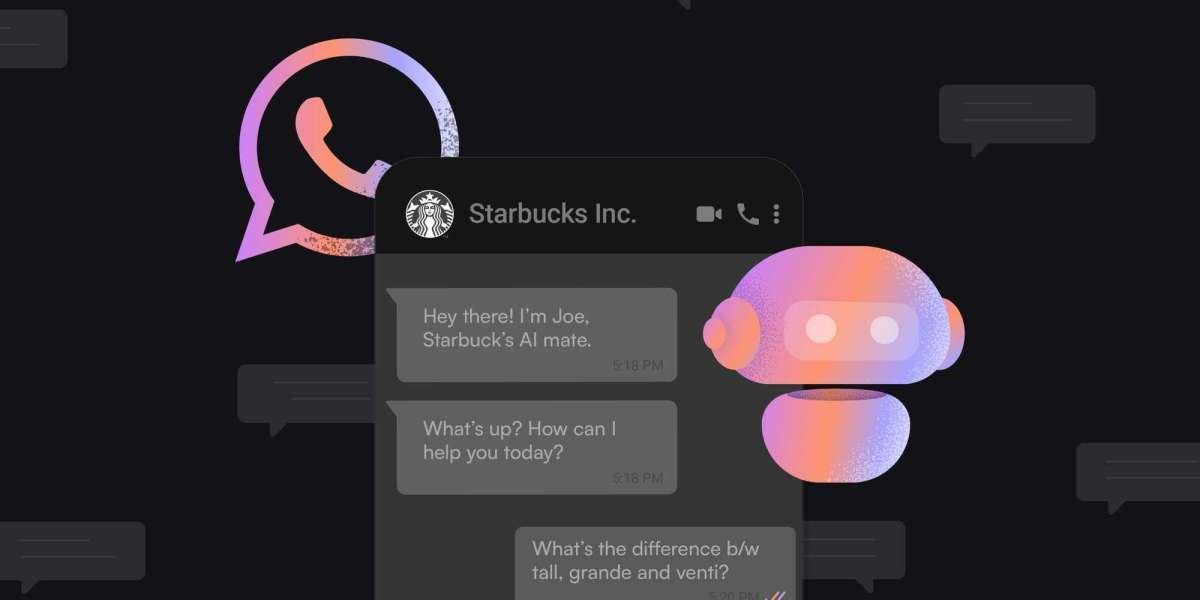In 2025, customer engagement is no longer just about having a presence on popular platforms — it’s about delivering instant, personalized, and seamless communication where your customers already spend their time. One of the most powerful tools for achieving this is a WhatsApp AI chatbot.
With over 2.7 billion monthly active users, WhatsApp is not just a messaging app; it’s the world’s largest conversational platform. Businesses that integrate AI-driven chatbots into WhatsApp can offer 24/7 support, automate sales, handle transactions, and personalize customer experiences — all without human intervention.
If you’re looking to get ahead of the competition, this guide will show you how WhatsApp AI chatbots can transform your business, their benefits, and best practices for implementation.
Why WhatsApp is the Perfect Platform for AI Chatbots
Before diving into the AI aspect, let’s explore why WhatsApp is such a strong choice for customer communication:
Global Reach – Your customers are already using WhatsApp, whether they’re in the US, Europe, Asia, or Africa.
High Engagement Rates – WhatsApp messages boast 98% open rates and significantly higher response rates compared to email.
Trusted Channel – Customers see WhatsApp as a personal, secure, and direct way to communicate.
Rich Media Support – Send images, videos, audio, PDFs, and even interactive buttons to enhance engagement.
When you combine WhatsApp’s reach and familiarity with AI chatbot intelligence, you unlock a tool that can automate and personalize customer engagement at scale.
What is a WhatsApp AI Chatbot?
A WhatsApp AI chatbot is a conversational program powered by Natural Language Processing (NLP) and machine learning that communicates with customers via WhatsApp. Unlike basic bots that rely on predefined scripts, AI chatbots can understand user intent, respond contextually, and learn over time.
With WhatsApp Business API, these chatbots can be integrated with your CRM, eCommerce platforms, booking systems, and payment gateways, making them capable of performing tasks like:
Answering FAQs instantly
Providing order tracking updates
Recommending products or services
Booking appointments
Collecting customer feedback
Processing payments
How a WhatsApp AI Chatbot Boosts Your Business
1. 24/7 Customer Support Without Added Costs
Hiring human agents to provide round-the-clock service can be expensive. AI chatbots can handle unlimited simultaneous conversations, ensuring customers get instant answers anytime.
Example: An online fashion store can assist customers at midnight by answering questions about sizing, delivery times, and return policies — all without human intervention.
2. Instant Lead Generation and Qualification
Instead of waiting for a contact form to be filled, AI chatbots engage leads the moment they message you, asking qualifying questions and capturing details in your CRM.
Example: A real estate company’s WhatsApp chatbot could ask users about location preferences, budget, and property type, then automatically schedule a call with a sales agent.
3. Personalized Customer Experiences
AI-powered chatbots can use customer history, preferences, and behavior to tailor interactions. This level of personalization can boost conversion rates and customer loyalty.
Example: A food delivery service’s chatbot could greet a returning customer with:
"Welcome back, Sarah! Would you like to reorder your favorite spicy ramen from last week?"
4. Faster Sales and Checkout Process
By integrating payment gateways directly into WhatsApp, AI chatbots allow customers to browse, add to cart, and pay — without leaving the chat.
Example: An electronics retailer could send a product catalog, answer questions, and provide a payment link — all in the same conversation.
5. Proactive Customer Engagement
AI chatbots can initiate conversations based on triggers like abandoned carts, upcoming renewals, or personalized offers.
Example: A subscription service could send a reminder:
"Hi John, your coffee subscription is about to renew. Would you like to try our new Ethiopian blend this month?"
6. Scalability Without Compromising Quality
Whether you have 100 or 10,000 customers messaging you at once, an AI chatbot maintains consistent, high-quality responses — something human teams can’t achieve cost-effectively.
7. Collecting Actionable Customer Insights
Every chatbot interaction generates valuable data — from frequently asked questions to buying patterns. This information can help you optimize your marketing, sales, and product strategy.
Competitive Advantages of WhatsApp AI Chatbots
Here’s why implementing a WhatsApp AI chatbot gives your business a competitive edge in 2025:
Speed – Respond instantly before competitors even see the message.
Convenience – Customers don’t need to download an app or visit a website.
Trust Factor – WhatsApp is end-to-end encrypted, building customer confidence.
Reduced Costs – Automation handles repetitive tasks so human agents can focus on complex cases.
Market Differentiation – While many businesses use WhatsApp, far fewer leverage AI for advanced personalization and automation.
Best Practices for Implementing a WhatsApp AI Chatbot
If you’re ready to add a WhatsApp AI chatbot to your business, follow these best practices to ensure success:
1. Define Clear Objectives
Do you want to focus on sales, customer support, lead generation, or all of the above? Your objectives will guide your chatbot’s design.
2. Use Natural, Human-Like Language
AI chatbots should sound like your brand voice — friendly, approachable, and easy to understand.
3. Offer Human Escalation
Always allow users to speak to a real person if the AI can’t solve their issue. This avoids frustration and builds trust.
4. Integrate with Business Systems
Connect your chatbot to CRM, eCommerce platforms, and inventory systems so it can provide accurate, real-time information.
5. Personalize Whenever Possible
Greet returning customers by name, remember past interactions, and recommend products based on their history.
6. Test and Optimize
Regularly review chatbot conversations, track KPIs like response time and resolution rate, and make improvements.
Real-World Use Cases Across Industries
Ecommerce: Product recommendations, abandoned cart recovery, order updates.
Travel & Hospitality: Booking confirmations, itinerary updates, multilingual support.
Healthcare: Appointment scheduling, symptom checkers, follow-up reminders.
Education: Enrollment assistance, course recommendations, student support.
Banking & Finance: Account balance queries, fraud alerts, loan application guidance.
The Future of WhatsApp AI Chatbots
In 2025 and beyond, we’ll see even smarter, more proactive chatbots that use predictive analytics, voice integration, and multi-language NLP to engage customers in real time. Businesses that adopt these technologies early will enjoy higher customer loyalty, better conversion rates, and stronger brand positioning.
Final Thoughts
A WhatsApp AI chatbot isn’t just a customer service tool — it’s a powerful business growth engine. It combines the global reach of WhatsApp with the intelligence of AI, developed by a trusted AI development company, to provide instant, personalized, and scalable customer engagement.
By integrating one into your business, you gain speed, personalization, cost efficiency, and a serious competitive edge. Whether you’re an online retailer, a service provider, or a multinational brand, the time to embrace WhatsApp AI chatbots is now.








